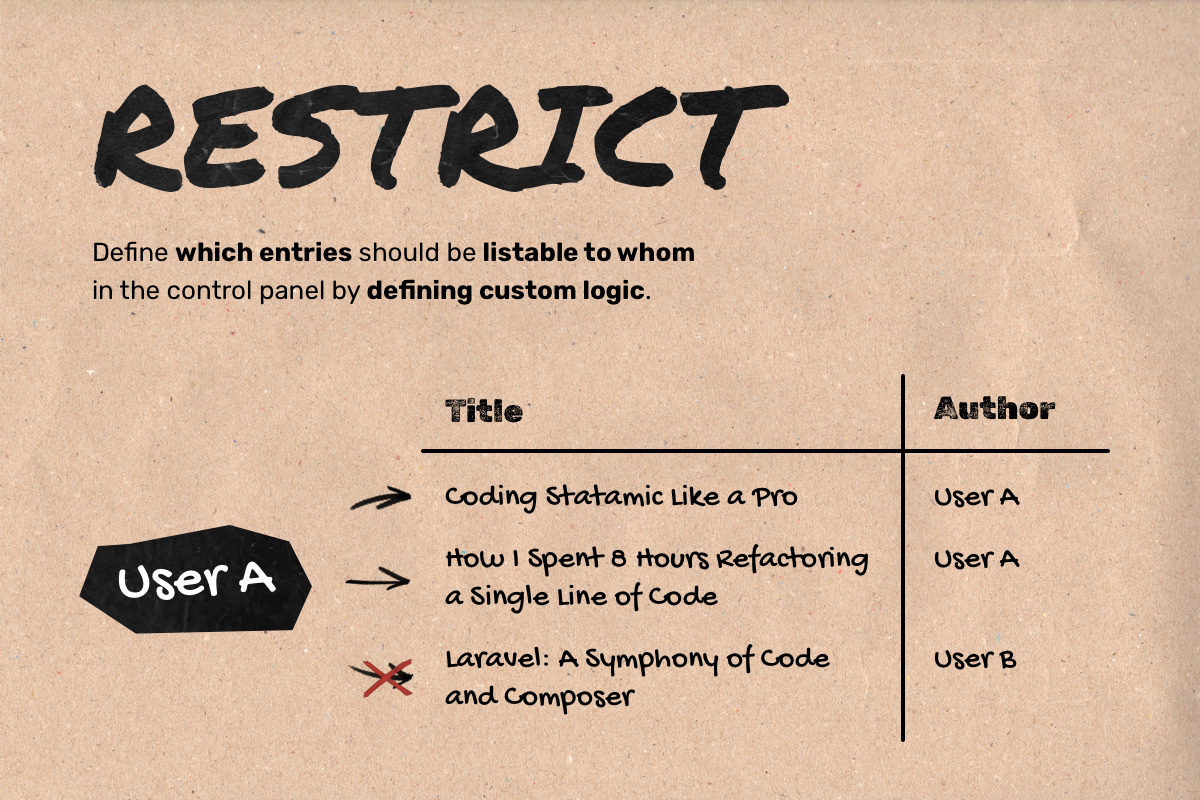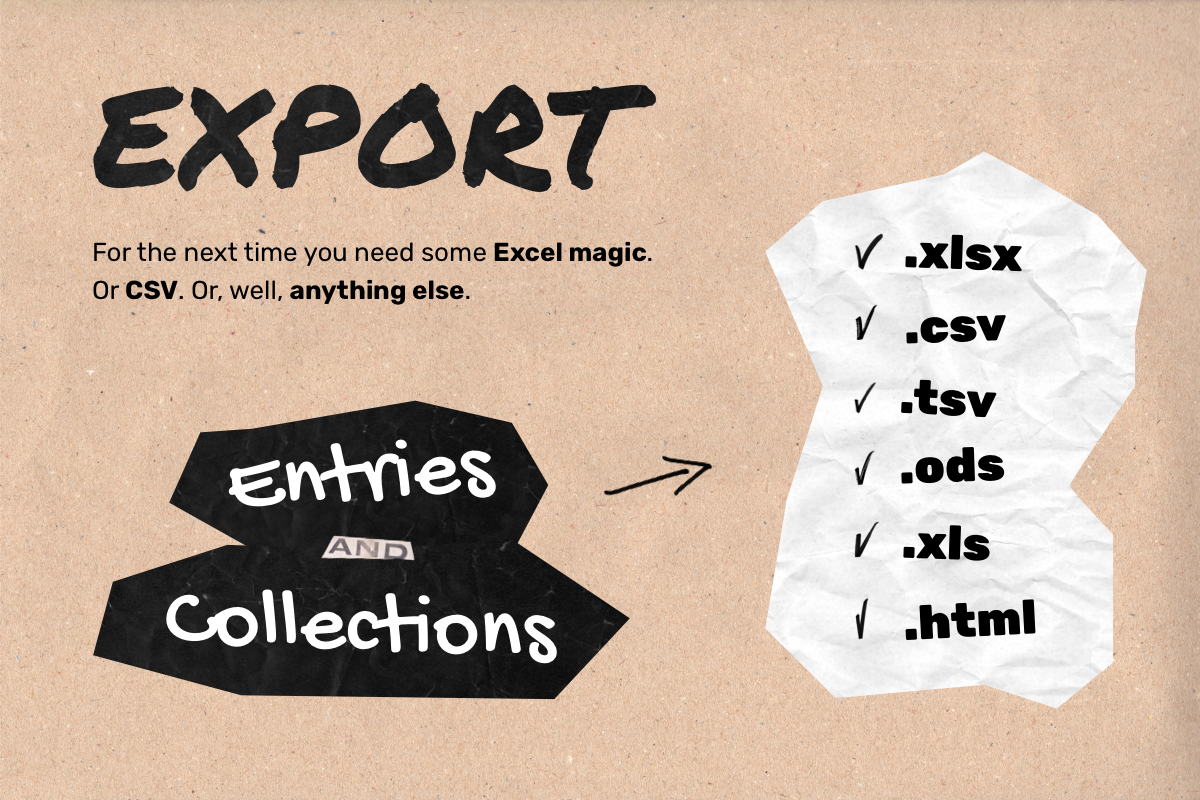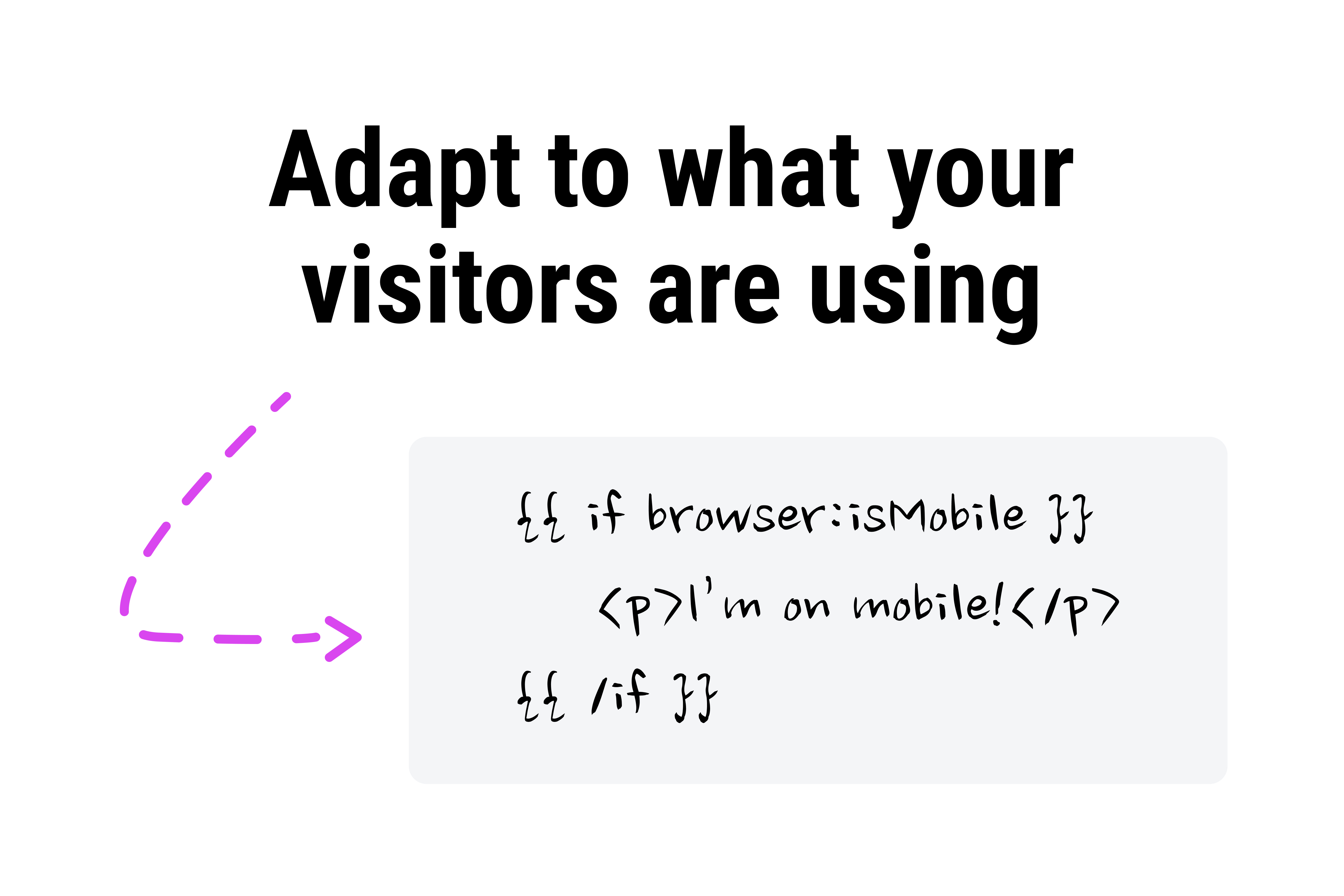A Statamic addon that applies your EntryPolicy's
viewmethod to entry listings in the control panel.
- ✅ Statamic v4
- ✅ Statamic v5
- ✅ Multisite
- ❌ Eloquent Driver
Note: Statamic Pro is required.
Features
Prevent entries from showing up in the control panel based on the EntryPolicy you define.
Upgrade Guide
From 0.4.x to 0.5.x
In versions v0.4.x you had to set a restriction closure in the AppServiceProvider to restrict entries. This will no
longer work. Instead, you can now set the restriction by extending the Statamic\Policies\EntryPolicy class and adjust
the view method to your needs, since this policy method will now be respected when querying entries in the control
panel.
Before, you've set your restrictions like this:
// v0.4.x: use Doefom\Restrict\Facades\Restrict;use Statamic\Contracts\Auth\User;use Statamic\Contracts\Entries\Entry; class AppServiceProvider extends ServiceProvider{ public function register(): void { // ... } public function boot(): void { Restrict::setRestriction(function (User $user, Entry $entry) { // Can view own entries only return $entry->authors()->contains($user->id()); }); }}Now you have to set your restrictions as explained in the Getting Started section.
From 0.3.x to 0.4.x
In versions up to 0.3.x there were hard coded permissions to view other authors' entries on a per-collection basis.
Those permissions are now removed and will no longer have any effect by default.
Getting Started
Installation
You can search for this addon in the Tools > Addons section of the Statamic control panel and click install, or
run the following command from your project root:
composer require doefom/restrictCreate a Custom Entry Policy
To properly use this addon it's best to create a custom entry policy. Make sure it extends the
default Statamic\Policies\EntryPolicy and overrides its view method. This method will be called to determine if an
entry is listed in the control panel or not.
Tip: You can create a custom policy by running:
php artisan make:policy MyEntryPolicyHere is what MyEntryPolicy could look like:
<?php namespace App\Policies; use Statamic\Policies\EntryPolicy; class MyEntryPolicy extends EntryPolicy{ public function view($user, $entry) { // ... } }Register Your Custom Entry Policy
Make sure to register your custom entry policy in your AppServiceProvider:
use Illuminate\Support\ServiceProvider; class AppServiceProvider extends ServiceProvider{ /** * Register any application services. */ public function register(): void { $this->app->bind( \Statamic\Policies\EntryPolicy::class, \App\Policies\MyEntryPolicy::class ); } /** * Bootstrap any application services. */ public function boot(): void { // ... }}And that's it! From now on, the view method of your custom entry policy will be called to determine if an entry should
be listed in the control panel or not. Your changes will also have an effect on the detail view of an entry and return
a 403 if the user is not allowed to view the entry.
Usage Examples
Basic Usage
By default, Statamic ships with the ability to restrict users from editing other authors' entries. Maybe you want your
users to not just not edit other authors' entries but rather not have them listed in the control panel at all. To
achieve this, you could adjust the view method of your custom entry policy like so:
use Statamic\Policies\EntryPolicy; class MyEntryPolicy extends EntryPolicy{ public function view($user, $entry) { $default = parent::view($user, $entry); if ($entry->blueprint()->hasField('author')) { return $default && $entry->authors()->contains($user->id()); } return $default; } }Using Permissions
You can check for anything in the view method of your policy. For example, you could define custom permissions in your
Statamic application and check for those.
Let's say you run an application where each user belongs to a company and each company has many entries. By default, a
user should only see entries of their own company. However, you might want to allow certain users to view entries of
other companies as well. For that you could add a permission to Statamic in your AppServiceProvider and check
for this permission in your custom entry policy.
Adding a Permission
use Illuminate\Support\ServiceProvider; class AppServiceProvider extends ServiceProvider{ /** * Register any application services. */ public function register(): void { // ... } /** * Bootstrap any application services. */ public function boot(): void { // Add one general permission to Statamic Permission::extend(function () { Permission::register('view entries of other companies') ->label('View entries of other companies'); }); } }Checking for the Permission
use Statamic\Policies\EntryPolicy; class MyEntryPolicy extends EntryPolicy{ public function view($user, $entry) { $default = parent::view($user, $entry); if ($user->hasPermission('view entries of other companies')) { // Can view all entries return $default; } // Can view entries of the same company only return $default && $user->get('company') === $entry->get('company'); } }Using Permissions on a Per-Collection Basis
Regarding the example above, you might also add a permission to each collection in your AppServiceProvider so that you
can prevent entries from being listed in the control panel if the current user belongs to another company. But this time
on a per-collection basis.
Adding the Permissions
use Illuminate\Support\ServiceProvider; class AppServiceProvider extends ServiceProvider{ /** * Register any application services. */ public function register(): void { // ... } /** * Bootstrap any application services. */ public function boot(): void { // Add one permission per collection Permission::extend(function () { Permission::get('view {collection} entries')->addChild( Permission::make("view {collection} entries of other companies") ->label("View entries of other companies") ); }); } }Checking for the Permissions
use Statamic\Policies\EntryPolicy; class MyEntryPolicy extends EntryPolicy{ public function view($user, $entry) { $default = parent::view($user, $entry); if ($user->hasPermission("view {$entry->collectionHandle()} entries of other companies")) { // Can view all entries in the entry's collection return $default; } // Can view entries of the same company only for this collection return $default && $user->get('company') === $entry->get('company'); } }Caveats
Works with Control Panel Routes Only
The addon only restricts entries from being listed in the control panel and therefore does not restrict entries from
being displayed on the front-end of your site or fetched from your API, that's entirely up to you. To know if the user
is currently on a control panel route we check if the route has the statamic.cp.authenticated middleware applied.
App Running in Console
If you run your app in the console, the addon will not have any effect.
class ServiceProvider extends AddonServiceProvider{ public function bootAddon(): void { if ($this->app->runningInConsole()) { return; } // ... }}Eloquent Driver
This addon does not work with the Eloquent driver. It only works with the default flat file driver. However, it is planned to support the Eloquent driver in the future.
Class Bindings
Restrict works by rebinding Statamic's EntryQueryBuilder and EntryPolicy (this one is done by you). If you were to
use custom bindings or another addon which also rebinds one of those classes, you might run into issues. That's just
something to keep in mind when using this addon.
// ----------------------------------------------------------------// Rebinding the Entry Policy in your AppServiceProvider// ---------------------------------------------------------------- $this->app->bind( \Statamic\Policies\EntryPolicy::class, \App\Policies\MyEntryPolicy::class); // ----------------------------------------------------------------// Rebinding the Entry Query Builder as done// by the Restrict addon in its ServiceProvider.// ---------------------------------------------------------------- $this->app->bind(\Statamic\Stache\Query\EntryQueryBuilder::class, function ($app) { return new \Doefom\Restrict\Stache\Query\EntryQueryBuilder($app['stache']->store('entries'));});



